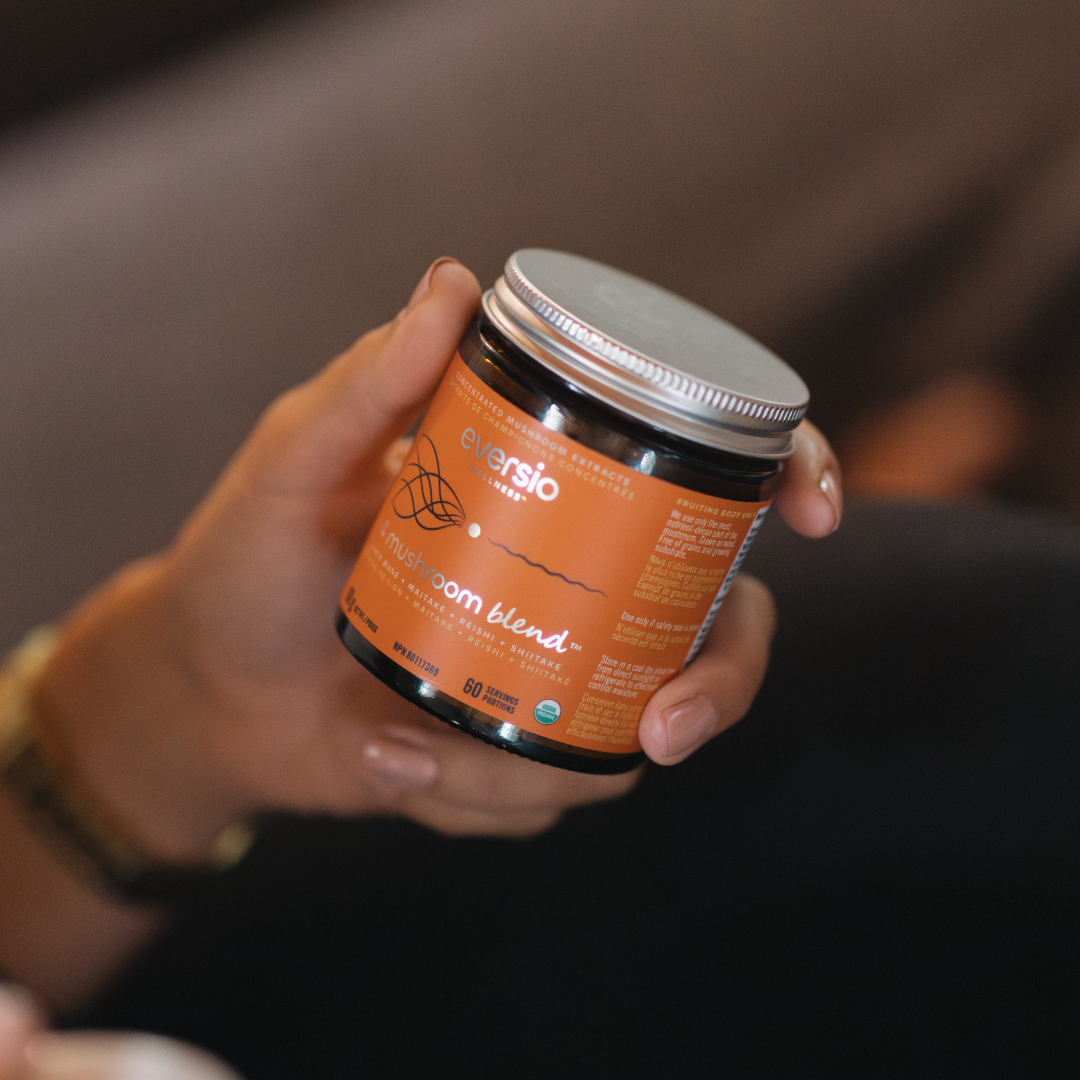Brain Health is a critical component of our overall health. However, it isn’t too often that we make the conscious decision to preserve the integrity of our brains and our mental and cognitive functioning. From sleeping to digestion to communication and more, our brain is paramount in controlling the daily functioning of our bodies.
One of the factors that people may find most concerning is memory loss. It feels as though every day we walk into a room, look around, and almost instantly forget why we entered in the first place! You may even find yourself googling “memory loss tests” or searching for memory supplements to prevent the progression or worsening of your current state.
Medicinal mushrooms are brain-loving fungi that have illustrated benefits across the board in improving brain health and even delaying the processes that lead to neurodegenerative diseases and memory impairment. They may be the answer in your search for the best supplements for memory improvement.

The Benefits of Lion's Mane Mushrooms
Lion’s Mane, also known as Hericium erinaceus, has been used for ages in both the culinary and medical worlds around the globe. Lion’s Mane health benefits are endless, but its most profound effects have been on improving memory and cognition.
Specifically, recognition memory is the ability to identify an event, object, or person that has been encountered previously. Most often, recognition memory faces an age-related decline, however, this is not to say that it cannot be reversed. One study found that supplementing the standardized extracts of two constituents from Lion’s Mane, hericenones and erinacine, reversed the age-decline of recognition memory in mice [1]. The results were associated with increased neurogenesis in the hippocampal and cerebellar regions of the brain [1]. While the cerebellar region of the brain is mainly concerned with motor functions, it is the hippocampus that has a major role in learning and memory. Lion’s Mane’s ability to induce the growth of nervous tissue (neurogenesis) in the hippocampus is likely the mechanism underlying its ability to regress recognition memory decline during aging [1].
As we age, our brain’s ability to form or preserve neuronal connections naturally declines and we progressively experience worsening mental functioning, including decline in memory. As mentioned, Lion’s Mane contains two active compounds, hericenones and erinacines, that have been found to stimulate the growth of brain cells through neurogenesis [1].
Additionally, another constituent, isohericerinol A, extracted from the fruiting body of Lion’s Mane, was found to strongly increase nerve growth factor (NGF) production, a neurotrophic factor that is involved in the growth, development, and survival of neurons, our body’s specialized information messengers [2]. In fact, in a study comparing the augmentation or blocking of NGF, blocking of NGF significantly impaired memory and hippocampal activity [3].
Lion's Mane Studies and Research
Lion’s Mane has also been studied to prevent the damage caused by beta-amyloid plaques; naturally occurring proteins that may build up in the brain and disrupt proper cell functioning, leading to neurodegenerative diseases [3,4,5]. Although this mushroom may be of great benefit to those interested in preventing cognitive decline due to family history, it is also suitable for the average person to improve memory and concentration.
Mild cognitive impairment (MCI) is an early stage of memory loss or other loss of cognitive ability. A randomized control trial studied the effects of Lion’s Mane mushroom extract compared to placebo on Japanese men and women diagnosed with MCI [7]. At weeks 8, 12, and 16 of the trial, the Lion’s Mane group consistently showed significant improvement in cognitive functioning compared to the placebo group [7]. The results of the study confirmed that Lion’s Mane would be an effective alternative method for improving MCI while showing no adverse effects [7].
Difficulties with our memory can cause us a great deal of stress, especially as we age. Terms such as dementia get thrown around over minor memory oversights and may even instill fear in us. The search for preventative neuroprotective compounds that act on the maintenance, survival, and regeneration of our neurons is increasing, especially ones derived from natural sources. Medicinal mushrooms are overall functional foods, but Lion’s Mane specifically has been well studied for its promotion of brain health. Try making mushroom coffee a part of your morning routine!

We hope you have found this article informative. If you have any questions or comments, please feel free to leave them in the comment section below!
By Silvana Jakupovic — BSc and 4th Year Student of Naturopathic Medicine (CCNM-Boucher)
References:
[1] Ratto D, Corana F, Mannucci B, Priori EC, Cobelli F, Roda E, Ferrari B, Occhinegro A, Di Iorio C, De Luca F, Cesaroni V, Girometta C, Bottone MG, Savino E, Kawagishi H, Rossi P. Hericium erinaceus Improves Recognition Memory and Induces Hippocampal and Cerebellar Neurogenesis in Frail Mice during Aging. Nutrients. 2019 Mar 27;11(4):715. doi: 10.3390/nu11040715. PMID: 30934760; PMCID: PMC6521003.
[2] Ryu SH, Hong SM, Khan Z, Lee SK, Vishwanath M, Turk A, Yeon SW, Jo YH, Lee DH, Lee JK, Hwang BY, Jung JK, Kim SY, Lee MK. Neurotrophic isoindolinones from the fruiting bodies of Hericium erinaceus. Bioorg Med Chem Lett. 2021 Jan 1;31:127714. doi: 10.1016/j.bmcl.2020.127714. Epub 2020 Nov 25. PMID: 33246107.
[3] Conner JM, Franks KM, Titterness AK, Russell K, Merrill DA, Christie BR, Sejnowski TJ, Tuszynski MH. NGF is essential for hippocampal plasticity and learning. J Neurosci. 2009 Sep 2;29(35):10883-9. doi: 10.1523/JNEUROSCI.2594-09.2009. PMID: 19726646; PMCID: PMC2765804.
[4] Tsai-Teng T, Chin-Chu C, Li-Ya L, Wan-Ping C, Chung-Kuang L, Chien-Chang S, Chi-Ying HF, Chien-Chih C, Shiao YJ. Erinacine A-enriched Hericium erinaceus mycelium ameliorates Alzheimer's disease-related pathologies in APPswe/PS1dE9 transgenic mice. J Biomed Sci. 2016 Jun 27;23(1):49. doi: 10.1186/s12929-016-0266-z. PMID: 27350344; PMCID: PMC4924315.
[5] Zhang J, An S, Hu W, Teng M, Wang X, Qu Y, Liu Y, Yuan Y, Wang D. The Neuroprotective Properties of Hericium erinaceus in Glutamate-Damaged Differentiated PC12 Cells and an Alzheimer's Disease Mouse Model. Int J Mol Sci. 2016 Nov 1;17(11):1810. doi: 10.3390/ijms17111810. PMID: 27809277; PMCID: PMC5133811.
[6] Cheng JH, Tsai CL, Lien YY, Lee MS, Sheu SC. High molecular weight of polysaccharides from Hericium erinaceus against amyloid beta-induced neurotoxicity. BMC Complement Altern Med. 2016 Jun 7;16:170. doi: 10.1186/s12906-016-1154-5. PMID: 27266872; PMCID: PMC4895996.
[7] Mori K, Inatomi S, Ouchi K, Azumi Y, Tuchida T. Improving effects of the mushroom Yamabushitake (Hericium erinaceus) on mild cognitive impairment: a double-blind placebo-controlled clinical trial. Phytother Res. 2009 Mar;23(3):367-72. doi: 10.1002/ptr.2634. PMID: 18844328.




















Leave a comment
All comments are moderated before being published.
This site is protected by hCaptcha and the hCaptcha Privacy Policy and Terms of Service apply.